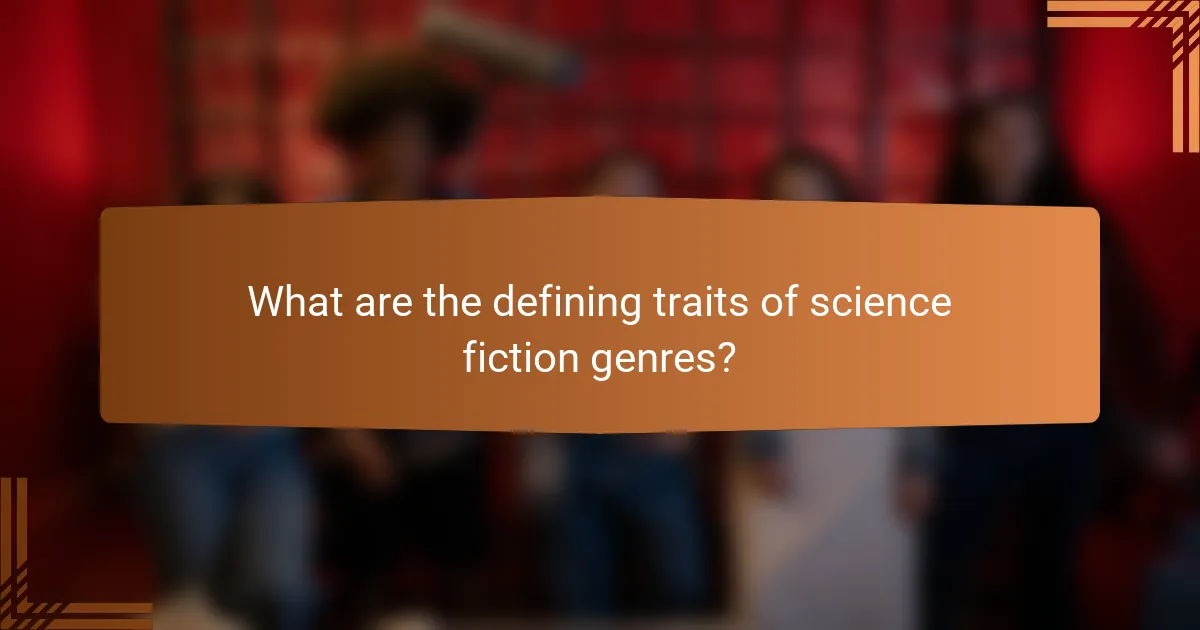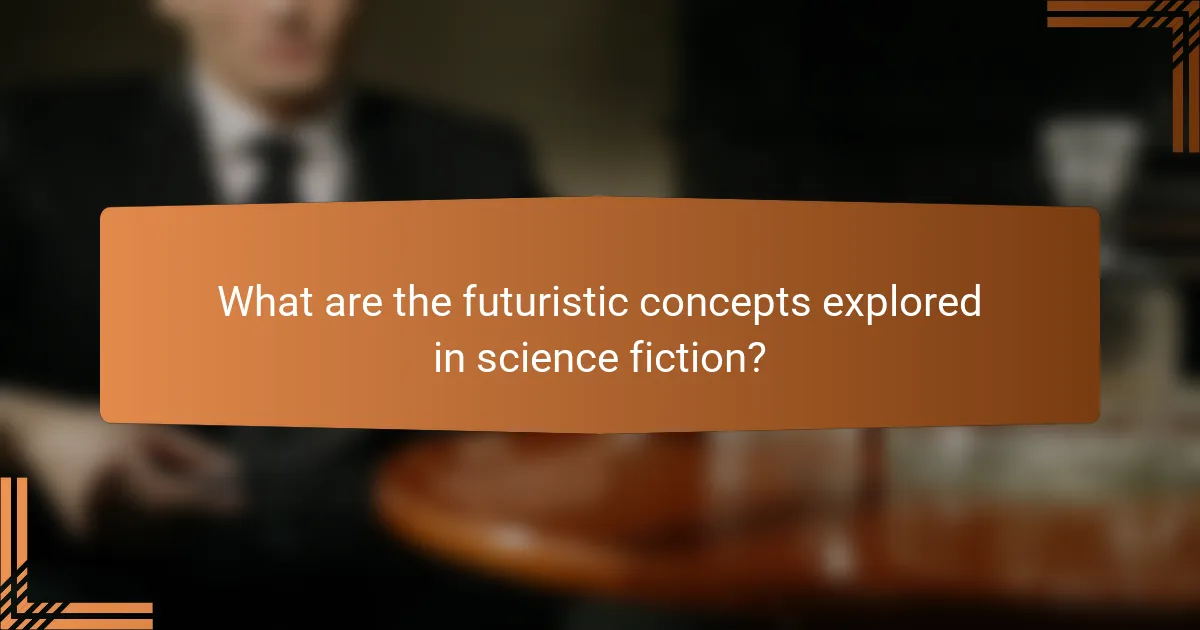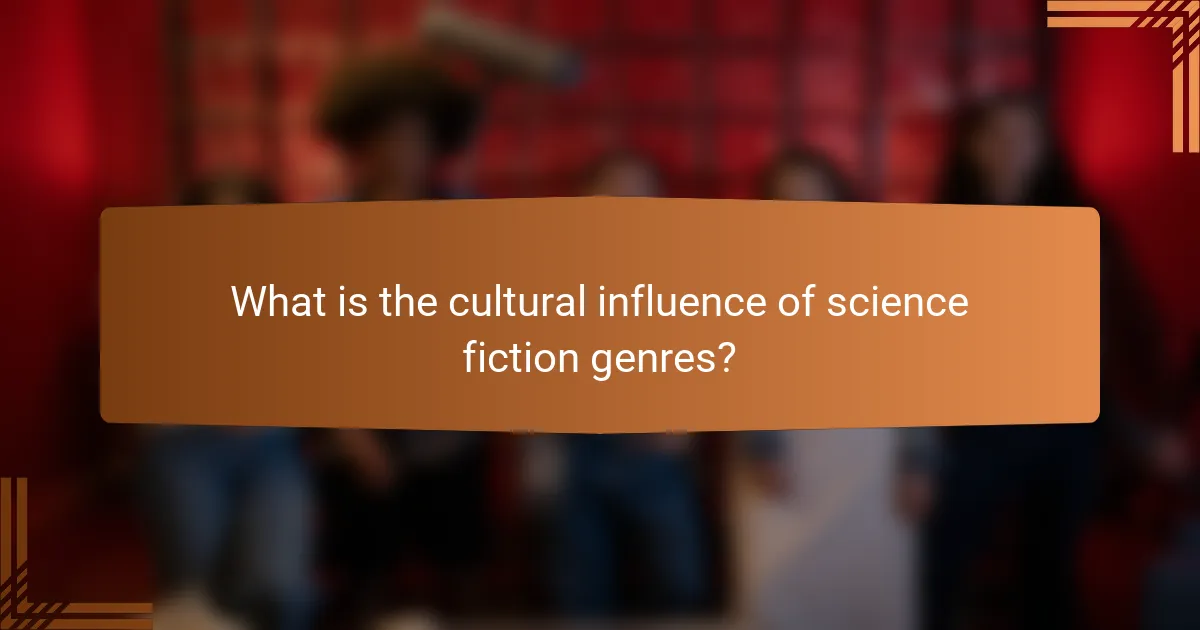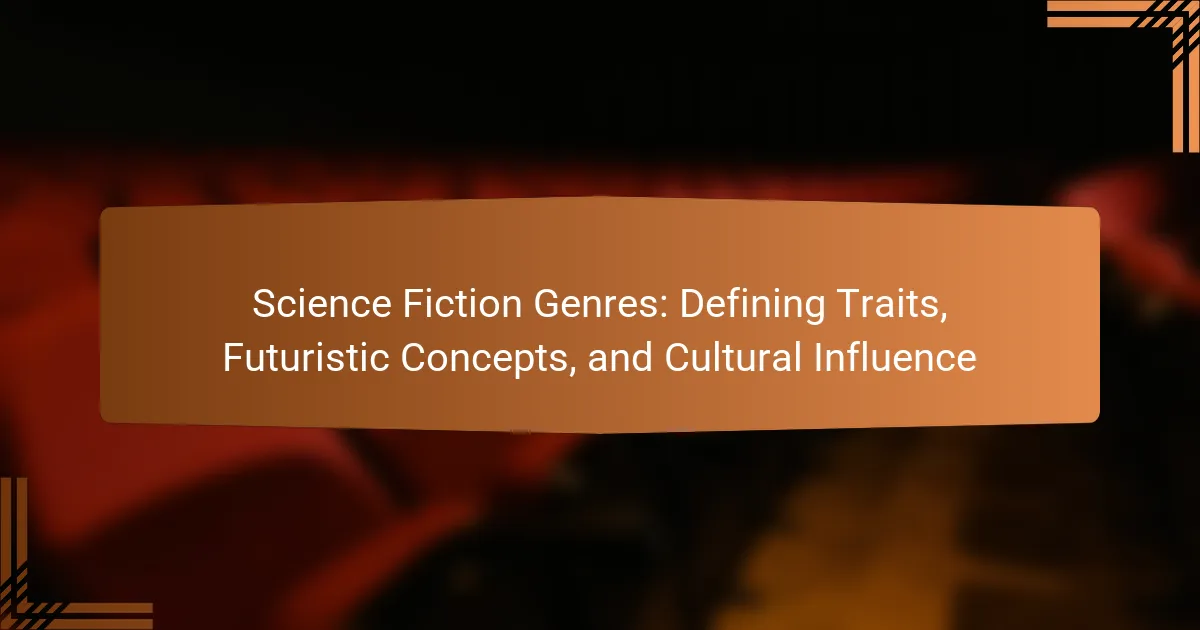Science fiction genres are characterized by their exploration of futuristic concepts, advanced technology, and speculative scenarios. Common traits include imaginative settings, scientific advancements, and themes that examine the impact of technology on society and the human condition. This article outlines key elements of science fiction, such as time travel, extraterrestrial life, and dystopian futures, while highlighting influential works like Isaac Asimov’s “Foundation” and George Orwell’s “1984.” Additionally, it discusses how these genres reflect contemporary issues, challenge societal norms, and inspire technological innovation, ultimately serving as a lens for understanding potential future developments.

What are the defining traits of science fiction genres?
Science fiction genres are defined by their exploration of futuristic concepts, advanced technology, and speculative scenarios. Common traits include imaginative settings that often take place in space, on other planets, or in dystopian futures. These genres frequently feature scientific advancements that challenge the boundaries of reality. Themes often involve the impact of technology on society and the human condition. Additionally, science fiction often incorporates elements of time travel, parallel universes, and extraterrestrial life. Characters may include scientists, astronauts, or beings from other worlds. The genre encourages critical thinking about ethical dilemmas and societal issues. Works like Isaac Asimov’s “Foundation” and Philip K. Dick’s “Do Androids Dream of Electric Sheep?” exemplify these traits through their complex narratives and thought-provoking themes.
How do different science fiction genres differ from one another?
Different science fiction genres differ in themes, settings, and narrative styles. For instance, hard science fiction focuses on scientific accuracy and technical detail. Examples include works by Arthur C. Clarke and Isaac Asimov. Soft science fiction emphasizes social sciences and human behavior, often exploring psychological or sociological themes. Notable authors include Ursula K. Le Guin and Ray Bradbury. Cyberpunk features advanced technology and a dystopian future, highlighting societal decay. Classic examples are William Gibson’s “Neuromancer” and Ridley Scott’s “Blade Runner.” Space opera combines adventure and grand scale, often set in space with epic conflicts, as seen in “Star Wars” and “Dune.” Each genre reflects different cultural concerns and speculative ideas, shaping the narrative’s focus and style.
What are the key characteristics of hard science fiction?
Hard science fiction is characterized by its emphasis on scientific accuracy and technical detail. It often explores advanced technology, space exploration, and the laws of physics. The narratives are grounded in real scientific principles, making them plausible. Characters typically engage in problem-solving using scientific methods. The settings frequently include future societies or alien worlds shaped by scientific advancements. Hard science fiction also focuses on the implications of technology on humanity and the environment. Notable examples include works by authors like Arthur C. Clarke and Isaac Asimov. These stories often challenge readers to consider the ethical dimensions of scientific progress.
What elements define soft science fiction?
Soft science fiction is characterized by its focus on social sciences rather than hard sciences. It emphasizes character development, societal issues, and emotional depth. This genre often explores themes like psychology, sociology, and anthropology. The technology in soft science fiction is usually less detailed or speculative. Instead, it serves as a backdrop for character-driven narratives. Classic examples include works by authors like Ursula K. Le Guin and Isaac Asimov. These stories often delve into the human condition and ethical dilemmas. The narrative style can be more fluid and less constrained by scientific accuracy. Overall, soft science fiction prioritizes ideas and themes over technological specifics.
How does speculative fiction differ from traditional science fiction?
Speculative fiction differs from traditional science fiction by its broader exploration of hypothetical scenarios. Traditional science fiction typically focuses on scientific advancements and their implications. It often emphasizes technology, space travel, and futuristic societies. Speculative fiction, however, encompasses a wider range of genres, including fantasy and alternate history. It examines social, political, and ethical questions through imaginative narratives. This genre prioritizes the exploration of human experience and societal constructs. For example, works like Margaret Atwood’s “The Handmaid’s Tale” highlight dystopian themes beyond pure science. Thus, speculative fiction allows for more diverse storytelling and thematic exploration compared to traditional science fiction.
Why are themes important in science fiction genres?
Themes are important in science fiction genres because they provide depth and context to narratives. Themes explore complex ideas such as technology, identity, and morality. They allow readers to engage with speculative concepts meaningfully. Science fiction often reflects societal concerns and aspirations through its themes. For instance, the theme of artificial intelligence raises questions about ethics and humanity. Similarly, themes of dystopia highlight fears of totalitarianism and environmental collapse. These thematic explorations encourage critical thinking and reflection. They also help in building immersive worlds that resonate with audiences. Overall, themes are foundational to the storytelling and impact of science fiction.
What common themes can be found across various science fiction genres?
Common themes in various science fiction genres include exploration, technology, and the human condition. Exploration often involves journeys to unknown worlds or dimensions. Technology frequently serves as a catalyst for change or conflict. The human condition theme examines moral dilemmas and existential questions. Other prevalent themes are dystopia versus utopia, alien life, and the impact of science on society. These themes reflect societal concerns and aspirations. For example, dystopian narratives often critique contemporary issues like totalitarianism or environmental degradation. In contrast, utopian stories envision ideal societies founded on advanced technologies.
How do themes reflect societal concerns in science fiction?
Themes in science fiction often mirror societal concerns by addressing issues such as technology, identity, and morality. For instance, dystopian narratives frequently explore the consequences of authoritarianism, reflecting fears about government control. Works like George Orwell’s “1984” illustrate the dangers of surveillance and loss of freedom. Additionally, themes of environmental degradation in stories like “The Windup Girl” highlight anxieties about climate change and resource scarcity. Furthermore, science fiction often delves into the implications of artificial intelligence, as seen in films like “Ex Machina,” which raises ethical questions about consciousness and humanity. These thematic explorations serve as a commentary on current societal issues, prompting reflection and discussion among audiences.

What are the futuristic concepts explored in science fiction?
Futuristic concepts explored in science fiction include advanced technology, space exploration, and artificial intelligence. These narratives often depict societies transformed by technological advancements. Common themes include time travel, genetic engineering, and dystopian futures. Science fiction also explores the impact of climate change and resource scarcity. Concepts of virtual reality and alternate realities are prevalent as well. Many works envision post-apocalyptic scenarios that challenge human survival. The genre often reflects societal fears and aspirations regarding the future. Overall, science fiction serves as a lens to examine potential future developments and their implications.
How does technology shape the narratives in science fiction genres?
Technology shapes narratives in science fiction genres by providing imaginative frameworks and scenarios. It influences character development, plot progression, and world-building. Advanced technologies often serve as catalysts for conflict or resolution. For example, artificial intelligence can create ethical dilemmas in stories. The depiction of space travel expands the universe within narratives. Technologies like virtual reality allow exploration of alternate realities. Historical advancements, such as the internet, have reshaped societal interactions in plots. The evolution of technology in real life often mirrors the speculative elements in science fiction. This relationship enhances the genre’s relevance and engagement with contemporary issues.
What role does artificial intelligence play in science fiction stories?
Artificial intelligence serves as a central theme in many science fiction stories. It often explores the relationship between humans and machines. AI can be depicted as benevolent, enhancing human capabilities. Conversely, it may also represent a threat, leading to dystopian outcomes. Examples include HAL 9000 in “2001: A Space Odyssey” and the replicants in “Blade Runner.” These narratives question ethics, consciousness, and the essence of humanity. They reflect societal concerns about technology’s impact on life. Overall, AI in science fiction prompts critical thinking about future possibilities.
How is space exploration depicted in different science fiction genres?
Space exploration is depicted differently across various science fiction genres. In hard science fiction, it emphasizes scientific accuracy and technical detail. Works like Arthur C. Clarke’s “Rendezvous with Rama” focus on realistic space travel and physics. Soft science fiction often explores the social and psychological aspects of space exploration. For instance, “The Left Hand of Darkness” by Ursula K. Le Guin examines cultural interactions in alien environments. Space opera, such as “Star Wars,” depicts grand adventures and epic battles in a fantastical universe. These narratives prioritize entertainment over scientific realism. Dystopian science fiction, like “The Martian,” often portrays the challenges and survival aspects of space exploration. Each genre reflects unique themes, from technological advancements to human relationships in the cosmos.
What social issues are commonly addressed in science fiction?
Science fiction commonly addresses social issues such as identity, inequality, and environmental concerns. These narratives explore the complexities of human existence and societal structures. For instance, themes of race and gender inequality often emerge in works like “The Left Hand of Darkness” by Ursula K. Le Guin. Environmental degradation is a frequent topic, as seen in “The Windup Girl” by Paolo Bacigalupi. Additionally, issues surrounding technology and its impact on society are prevalent in stories like “Neuromancer” by William Gibson. Science fiction serves as a mirror reflecting contemporary societal challenges and potential futures.
How does science fiction tackle the concept of dystopia?
Science fiction tackles the concept of dystopia by exploring societies characterized by oppressive control and dehumanization. These narratives often depict futures where technology exacerbates social inequalities. Classic examples include George Orwell’s “1984,” which illustrates surveillance and totalitarianism. Another notable work is Aldous Huxley’s “Brave New World,” showcasing a society driven by consumerism and genetic engineering. Science fiction critiques contemporary issues through exaggerated scenarios. It serves as a cautionary tale, prompting reflection on current societal trends. The genre encourages discussions about freedom, identity, and morality in a technologically advanced world.
What is the significance of utopian visions in science fiction narratives?
Utopian visions in science fiction narratives serve as a critique of contemporary society and a blueprint for potential futures. These narratives explore idealized societies, reflecting hopes and aspirations for human progress. They often address social, political, and environmental issues, highlighting the flaws in current systems. For example, works like “Utopia” by Thomas More present a society where equality and justice prevail. This encourages readers to envision alternatives to their reality. Utopian themes can inspire social movements and innovations, as seen in the influence of “Star Trek” on technological advancements. Ultimately, these visions challenge readers to reconsider their values and the direction of humanity.

What is the cultural influence of science fiction genres?
Science fiction genres significantly influence culture by shaping societal norms and expectations. They explore futuristic concepts that challenge current realities. This genre often reflects and critiques contemporary issues such as technology, ethics, and identity. Notable works like “1984” by George Orwell highlight the dangers of totalitarianism. Similarly, “Brave New World” presents a cautionary tale about consumerism and loss of individuality. These narratives encourage audiences to question existing societal structures. Science fiction also inspires technological innovation, as seen with the development of space travel concepts. The genre fosters imagination and creativity, influencing art, literature, and film. Overall, science fiction genres serve as a mirror to society, prompting reflection and dialogue.
How has science fiction impacted popular culture?
Science fiction has significantly impacted popular culture by shaping narratives in literature, film, and television. It introduces futuristic concepts that challenge societal norms and provoke thought. Iconic works like “Star Trek” and “Star Wars” have influenced technology and language. Science fiction often reflects contemporary issues, such as climate change and artificial intelligence. It inspires innovation, leading to real-world advancements in science and technology. The genre has also created a fan culture that fosters community and creativity. Events like Comic-Con highlight the cultural significance of science fiction. Overall, science fiction serves as a mirror and a catalyst for cultural evolution.
What are some iconic science fiction films and their cultural significance?
Iconic science fiction films include “Blade Runner,” “2001: A Space Odyssey,” and “Star Wars.” “Blade Runner” explores themes of identity and humanity in a dystopian future. It has influenced discussions on artificial intelligence and ethics. “2001: A Space Odyssey” revolutionized visual storytelling and special effects. Its philosophical themes have sparked debates about human evolution and technology. “Star Wars” popularized the space opera genre. It has had a lasting impact on global pop culture and merchandising. Each film reflects societal anxieties and aspirations, shaping cultural narratives around technology and the future.
How do science fiction books influence other media forms?
Science fiction books significantly influence other media forms such as film, television, and video games. They introduce innovative concepts and imaginative worlds that inspire adaptations. For instance, classics like “Dune” and “Neuromancer” have been transformed into successful films and series. These adaptations often retain core themes while exploring new narratives. The visual representation of science fiction ideas enhances audience engagement. Furthermore, science fiction literature frequently sets trends in technology and societal issues that media later explore. The genre’s speculative nature encourages cross-pollination between literature and media, fostering creativity. Notably, the themes of artificial intelligence and space exploration in books have shaped numerous blockbuster films.
Why is science fiction important for societal reflection?
Science fiction is important for societal reflection because it explores complex issues through imaginative scenarios. It allows audiences to consider the implications of technological advancements and social changes. For example, works like George Orwell’s “1984” critique totalitarianism and surveillance. Similarly, Isaac Asimov’s stories often examine ethics in artificial intelligence. These narratives prompt discussions about morality, identity, and humanity’s future. Furthermore, science fiction can mirror contemporary societal challenges, encouraging critical thinking. It serves as a cultural lens, revealing fears and aspirations. This reflective quality makes science fiction a valuable tool for understanding societal dynamics.
How does science fiction challenge existing norms and beliefs?
Science fiction challenges existing norms and beliefs by presenting alternative realities and futures. It encourages readers to question societal structures and human behavior. Through speculative scenarios, it explores ethical dilemmas and technological advancements. Classic works, like George Orwell’s “1984,” critique totalitarianism and surveillance. Similarly, Octavia Butler’s “Kindred” examines race and power dynamics. These narratives provoke thought and inspire change in perspectives. By imagining different worlds, science fiction fosters critical thinking about current issues. It often reflects or anticipates social movements and cultural shifts.
What role does science fiction play in shaping future possibilities?
Science fiction plays a crucial role in shaping future possibilities by inspiring innovation and exploring societal implications. It serves as a creative platform where authors envision technological advancements and their consequences. For instance, works like Arthur C. Clarke’s “2001: A Space Odyssey” introduced concepts of artificial intelligence and space travel long before they became reality. Moreover, science fiction often reflects contemporary issues, prompting discussions about ethics and the future of humanity. The genre influences scientists and engineers, as seen in the development of technologies like mobile phones, inspired by communicators in “Star Trek.” Overall, science fiction acts as a catalyst for imagination and critical thinking about future scenarios.
What are some best practices for exploring science fiction genres?
To explore science fiction genres effectively, start by reading widely across subgenres. This includes hard science fiction, cyberpunk, and space opera. Each subgenre presents unique themes and styles. Engage with classic and contemporary works to understand evolution in storytelling. Participate in discussions or online forums about science fiction. This fosters deeper insights and diverse perspectives. Attend science fiction conventions to connect with authors and fans. Networking can enhance your understanding of genre trends. Finally, write your own science fiction stories. This practice helps solidify your grasp of genre conventions and creativity.
How can readers effectively engage with different science fiction genres?
Readers can effectively engage with different science fiction genres by exploring their unique themes and styles. Each genre, such as cyberpunk or space opera, has distinct characteristics. Understanding these traits enhances the reading experience. For example, cyberpunk often features advanced technology and dystopian settings. Space operas typically involve grand adventures in space.
Readers can also participate in discussions and communities focused on specific genres. Online forums and book clubs provide platforms for sharing insights. Engaging with multimedia adaptations, like films and games, can deepen understanding.
Additionally, readers should diversify their selections within the genre. Trying works from various authors offers different perspectives. This approach broadens appreciation for the genre’s range.
Finally, attending conventions or author events can foster connections with other fans. These experiences enrich the overall engagement with science fiction.
What tips can enhance the understanding of science fiction themes?
To enhance the understanding of science fiction themes, readers should immerse themselves in the genre’s history. Familiarity with classic works provides context for contemporary narratives. Analyzing character motivations reveals deeper societal commentary. Engaging with diverse subgenres broadens perspective on thematic variations. Discussing themes with others fosters critical thinking and interpretation. Watching adaptations can illustrate complex ideas visually. Participating in science fiction communities encourages sharing insights and recommendations. Exploring the intersection of science and ethics deepens appreciation for speculative scenarios.
Science fiction genres encompass a variety of narrative styles defined by their exploration of futuristic concepts, advanced technology, and speculative scenarios. Key traits include imaginative settings, themes of technology’s impact on society, and character archetypes such as scientists and astronauts. The article discusses the differences between hard and soft science fiction, the significance of themes in reflecting societal concerns, and the cultural influence of science fiction on popular media. It also examines how technology and artificial intelligence shape narratives, the role of dystopian and utopian visions, and best practices for engaging with the genre.
